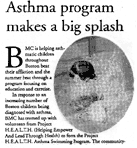JULY 1997
BMC is helping asthmatic children throughout Boston beat their affliction and the summer heat through a program focusing on education and exercise.

In response to in increasing number of Boston children being diagnosed with asthma, BMC his teamed up with volunteers from Project HEALTH (Helping Empower, Advocate, And Lead Through Health) to form the Project HEALTH Asthma Swimming Program. The community-based project, conducted through the Pediatrics and Allergy/Respiratory Departments at BMC, provides children suffering from chronic asthma with a structured swimming program to improve their physical condition and reaches them about their illness through a health education curriculum. Children learn how to stay active, despite having asthma.
“Asthma has reached epidemic proportions among children in Boston,” says Suzanne Steinbach, MD, chair of the Pediatric Allergy/Respiratory Department at BMC and co-founder of the Asthma Swimming Program. “We needed a novel approach to battle this disease. This program allows us to provide a health-promoting experience for our patients as well as for many children in the community.”
The program is held twice a week at the Holland Community Center in Dorchester and is staffed by volunteers from Project HEALTH, a Harvard University undergraduate organization dedicated to programs of social and health advocacy. The children in the program, all between the ages of 8 and 14, are BMC patients or are from the surrounding community. At each session, the children receive one hour of swimming instruction and one hour of asthma education. Thanks to various sponsors, there is no cost to the families.
“Although the program requires a major time commitment from the volunteers, this is not a complicated or sophisticated idea,” says Steinbach. “Something as straightforward as this program can make a big difference in the lives of these children.”
Asthma is a chronic which causes airway obstruction. Children am usually the most affected, experiencing labored breathing, coughing and wheezing. “Many people that any type of exertion will lead to an asthma attack,” says Steinbach. “This program helps relieve that anxiety. Staying fit is key to controlling asthma.”
Steinbach says swimming is an ideal sport for children with asthma because exercising in a humid environment is well tolerated, and swimming his been proven to improve lung function and decrease the frequency of asthma attacks.
Michael Lai, director of the Asthma Swimming Program, says the parents are extremely pleased with die program and the children are ecstatic. “The kids are having a great time. They never want to leave after the end of the day.”
Steinbach says the program will continue in the fall and, with the support of Boston Community Centers, may soon expand to other neighborhoods with high asthma rates.
